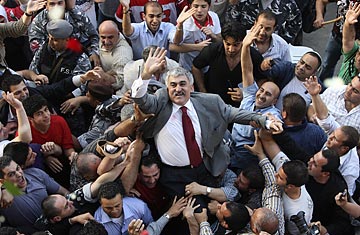
Supporters of newly released prisoner Ali Hajj, former police chief, carry him during a ceremony to mark his release in Beirut on April 29
The arrest in 2005 of four top officers in Lebanon's security services on suspicion of collaborating in the assassination of former Prime Minister Rafik Hariri was, to many, a sign that times had changed in Lebanon. Rarely had this war-torn country seen powerful men held to account for violent crimes — particularly when those crimes were deemed to suit Syria's agenda. So Wednesday's release from a Beirut prison of those same four former Lebanese generals will be taken as another sign of the waning of the movement to end Syrian hegemony in Lebanon.
Hariri's murder, for which many blamed Damascus, sparked a grass-roots movement — dubbed the Cedar Revolution by Washington — that forced the withdrawal of Syrian troops that had occupied the country since 1976. And when the new, Western-backed Lebanese government rounded up the pro-Syria generals at the request of the U.N. team investigating the Hariri case, it gave a boost to those hoping that Syrian influence over Lebanese affairs had ended for good. But much has changed over the past four years. (See pictures of life inside Hizballah.)
The release of the generals, in fact, is hardly surprising. After four years in prison without facing any formal charges, their continued detention had become an embarrassment to the international community. But because their release was ordered by a new U.N.-created tribunal in the Hague to try suspects in the Hariri assassination, it has left many in Lebanon wondering just how strong the case against Syria really is.
A 2005 report by a U.N. investigator of the assassination implicated top figures in the Syrian government of President Bashar al-Assad. The investigation had been initiated by the U.S. and France at the U.N. Security Council as a way of turning up the heat on al-Assad, whose stances on issues ranging from Iran and Iraq to Hizballah and Hamas had irked Washington. But in the years since that initial report, U.N. prosecutors have been much more circumspect about the substance of the case, and no one knows just who, if anyone, will be arraigned in the Hague. After all, the witness who had originally fingered the four Lebanese generals was later discredited and accused of taking bribes from anti-Syrian Lebanese politicians.
In the intervening years, Lebanon's U.S.-backed anti-Syrian political alliance has suffered setback after setback, beginning in 2006 when Syria's key Lebanese ally, the Shi'ite Islamist Hizballah, faced down the Israeli army in a 33-day summer war. Bouyed by that victory, Hizballah began a series of protests against the U.S.-backed government in Beirut, accusing it of collaborating in plans to disarm the group. The two-year political crisis that followed culminated last spring in Hizballah forces' storming pro-government militia headquarters in West Beirut. Their defeat on the streets forced the anti-Syrian coalition to accept a power-sharing arrangement that gave Hizballah an effective veto over government decisions. And elections to be held in June may see the Hizballah-led opposition take down the government itself.
Any setbacks in the investigation of Hariri's murder is cause for alarm among those who participated in the Cedar Revolution. The former Prime Minister was just the first victim in a series of highly professional assassinations of anti-Syrian politicians and journalists. But a resurgence of Syrian influence in Lebanon may not necessarily mean a return to the days when Syrian intelligence treated Lebanon as its own private playground. The two countries this year opened embassies in each other's capitals for the first time, marking a historic acceptance by Syria of Lebanon as an independent country rather than as a province unfairly carved off by France in the wake of World War I.
Moreover, with the Obama Administration reaching out to Syria, there may be less reason for the two countries to clash in Lebanon. Washington now hopes it can persuade Damascus to give up its support for Hizballah and other militants in exchange for first-class membership in the country club of international diplomacy. In fact, a Hariri investigation that fails to nail the leaders of the Syrian regime for the killing may actually be convenient to Washington's new agenda — conventional wisdom is that only a strong leader in Damascus could deliver on any possible peace deal with Israel. So although many will say justice has once again eluded Lebanon, peace may nonetheless be within reach.
See TIME's Pictures of the Week.
See the world's most influential people in the 2009 TIME 100.
